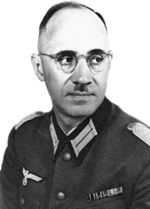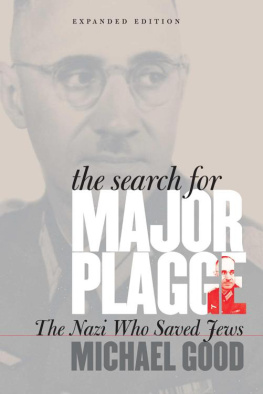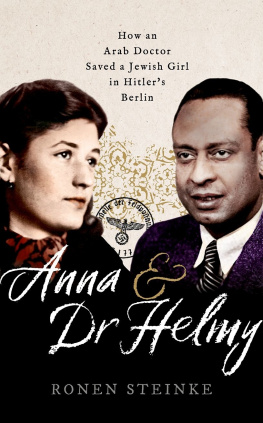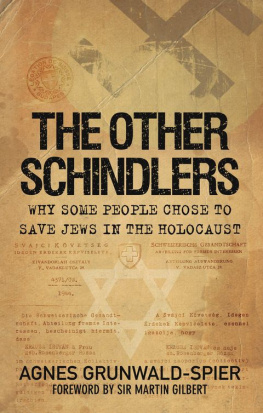The Search for Major Plagge
The Search for
THE NAZI WHO SAVED JEWS
Expanded Edition
MICHAEL GOOD
Major Plagge


Copyright 2006 Michael Good
All rights reserved. No part of this publication may be reproduced, stored in a retrieval system, or transmitted in any form or by any meanselectronic, mechanical, photocopy, recording, or any otherexcept for brief quotations in printed reviews, without the prior permission of the publisher.
Library of Congress Cataloging-in-Publication Data
Good, Michael, 1957
The Search for Major Plagge: the Nazi who saved Jews / Michael Good.Expanded ed.
p. cm.
Second editionT.p. verso.
Includes bibliographical references and index.
ISBN-13: 978-0-8232-2441-8 (pbk.: alk. paper)
ISBN-10: 0-8232-2441-4 (pbk.: alk. paper)
1. JewsPersecutionsLithuania. 2. Holocaust, Jewish (19391945)LithuaniaPersonal narratives. 3. Good, William Z. 4. Good, Pearl. 5. Plagge, Karl, 18971957. 6. Righteous Gentiles in the HolocaustGermanyBiography. 7. Good, MichaelCorrespondence. 8. LithuaniaEthnic relations. I. Title. II. Title: Search for Major Plagge.
DS135.L5G662 2006
940.53 1835092dc22
2006027866
Printed in the United States of America
08 07 06 5 4 3 2 1
Second edition
For my parents, William and Pearl Good, whose ability to remember
without bitterness and whose appreciation of their own good fortune
opened a world of discovery for their American son.
I believe that the time has come for all right-minded, well-disposed people to extend their hands to each other across national boundaries to form a community of the solitary among the nations. For whoever seeks truth and justice nowadays remains solitary in the midst of a blind multitude crying for power and violence.
Karl Plagge
CONTENTS
PREFACE TO THE SECOND EDITION
More than seven years have passed since I first traveled to Vilnius, Lithuania, during the summer of 1999 and began what would be a life-changing journey in search of the mysterious German officer who saved my mothers life. During these years of exploration, as I tried to uncover the motivations and deeds of Karl Plagge, I have often wondered how many of the Jews and Germans whose lives intersected at the HKP workshops in Vilna between 1941 and 1944 have still remained hidden from historys view. Since the publication of the first edition of this book, I have had the opportunity to hear from new groups of HKP survivors and also from a German veteran of Plagges unit, a man who had not talked about his wartime experiences outside of the family for more than sixty years. I am very happy to be able to share their remarkable stories in this new edition.
Reading through the first seven chapters of The Search for Major Plagge in the first edition, one cannot help but wonder about the role of the men of Plagges unit in the unusual events that transpired under the guise of repairing Wehrmacht vehicles in Vilna, Poland, during World War II. There were more than two hundred fifty officers and enlisted men in this unit, HKP 562, and it is clear from the testimony of Plagges subordinates at his 1947 denazification trial that some of the officers knew that many of the Jews employed in their workshops were not the essential skilled workers that Plagge had certified them to be. How many men within the unit understood that their commander was trying to thwart the efforts of the SS and save Jewish enemies of the state? Given the widespread anti-Semitism in Germany and the large measure of popular support enjoyed by the Nazi regime during the 1930s and early 1940s, one naturally wonders why Plagge was not denounced. With the discovery of Alfons von Deschwanden, a veteran of Plagges unit who spent three years in the HKP workshops in Vilna from July 1941 until the German retreat in July 1944, we have been given the opportunity to see the world through the eyes of a young German draftee thrust into the midst of the Holocaust in Vilna. Due to the willingness of this aging veteran to break years of silence, and with the help of his daughter who translated my inquiries, we are able to explore a myriad of fascinating questions. What did an average Wehrmacht soldier understand about the genocide being carried out in Vilna? When did he discover the murderous nature of the Nazi regime? What did he understand about his commanders attitudes toward the Jewish slave laborers? What moral dilemmas did he personally face? With this new testimony we are able to view the Holocaust in Vilna through the eyes of a German soldier and ponder in more detail what actions were possible in resisting the madness that prevailed during those terrible years.
Through the course of my original search I interviewed more than a dozen Jewish HKP survivors; however, there were undoubtedly more whom I had yet to encounter. After Vilna was liberated by the Red Army on July 13, 1944, the HKP survivors scattered across the globe. Most of the camps surviving children remained unidentified over the decades that followed. What details and stories did they have to tell that would help us understand the lifesaving events that led to their miraculous survival? Over the past two years I have had the good fortune to meet several new HKP survivors, and with the publication of this second edition I am able to share new material that has come to light. These new stories, like those of my original search, will, I hope, allow readers to once again ponder humanitys dual natureour propensity to act violently out of fear and bigotry, juxtaposed against our often unexpected capacity for acting with nobility and moral courage. It is this dual nature of man that I hope many will continue to think about; perhaps these stories of good and evil from Vilna will help illuminate for future generations the path that leads away from the horrors of war and genocide and toward that better side of human nature which we must all struggle to reveal within ourselves.
Michael Good
July 2006
I
An American Awakening
INTRODUCTION
On a warm spring day in June of 1999, I stood in the courtyard of the Heeres Kraftfahr Park (HKP) labor camp in Vilnius, Lithuania. Flanking the courtyard were tall buildings that had once housed over 1000 Jewish workers and their families, all slave laborers for the German war effort. I listened as my mother told the story of how she and her parents had survived the Holocaust, unlike so many other members of our family. She explained that her survival was largely due to the efforts of the German Army officer in charge of the HKP camp, a certain Major Plagge. He was better than Schindler! she exclaimed as she told how Major Plagge had protected his prisoners from the murderous intent of the SS.
I had traveled to Lithuania with my parents, wife and teenage children to see our city of origin, to hear of all those who were lost during the war and to retrace my parents tales of survival during the Holocaust. As I pondered the miracle of my familys existence, I asked my mother what had become of this German major. No one knows, she replied. Plagge had left Vilna with the retreating Germans in July 1944 and vanished into the chaos of the final months of the war. No one had heard of him since.
Squinting in the bright sun as I listened to my mother that morning, I had no idea what was beginning. I thought I had reached the pinnacle of our family journey, overcoming my fears of facing history, and then organizing my family to fly across the globe in search of a distant time and place. I could never have guessed that hearing my mothers story would mark a beginning, not an ending.
Next page








